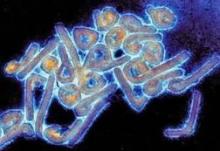For the first time, a novel antiviral treatment has saved the lives of primates when given in the late stage of infection with the Marburg virus, a lethal filovirus closely related to the Ebola virus.
Seven daily doses of the lipid-encapsulated small interfering RNA (siRNA) treatment started 3 days after exposure to a lethal dose of Marburg virus–Angola hemorrhagic fever (MARV-Angola) resulted in 100% protection in 16 rhesus macaques already showing clinical signs of the disease.
All untreated animals died; most died early on day 8 after infection, according to results reported in the Aug. 20 issue of Science Translational Medicine.
Delaying treatment until day 3 is clinically significant because this is the earliest time at which viremia can be detected, "showing real-world utility of this technology," study coauthor Thomas Geisbert, Ph.D., professor of microbiology and immunology at the University of Texas Medical Branch, Galveston, said during a press briefing.
The anti-MARV nucleoprotein-targeting siRNAs have been designed to protect against all known strains of Marburg virus, but will not protect against the Ebola virus.
A previous study, however, showed that the same technology completely protected rhesus monkeys exposed to the Zaire Ebola virus, the same species involved in the current outbreak, he said. That study examined treatment given only shortly after exposure, not when the signs of illness were already present, which is crucial to outbreak control (Lancet 2010;375:1896-905).
Still, the siRNA Ebola treatment could be used on a compassionate-use basis in the current Ebola outbreak, he added.
Recently two cases of MARV were imported to the United States and Europe, raising concerns about the public health threat posed by this virus.
There are no approved vaccines or drugs for humans infected with MARV-Angola. It has been associated with the highest case fatality rates of any strain or species of filovirus, causing 90% mortality in man in the largest Marburg outbreak in 2005 in Angola, Dr. Geisbert observed.
A phase I human study has been started with the Ebola siRNA product, but funding is needed before a trial evaluating the Marburg siRNA product can be launched in humans.
The antiviral strategy is based on siRNAs or double-stranded molecules that cause messenger RNA to be broken down after transcription. Thus, there is no translation of the Marburg virus proteins. The siRNAs are packaged in a proprietary lipid nanoparticle that serves as the delivery vehicle (Tekmira Pharmaceuticals, Burnaby, British Columbia).
Future work will examine how much further out treatment can be delayed in MARV-Angola as well as in Ebola hemorrhagic fever, Dr. Geisbert said.
So far, only one other strategy combining monoclonal antibodies and adenovirus vector expressing interferon-alpha has been shown to confer complete protection to macaques when given 3 days after infection (Sci. Transl. Med. 2013 Oct 16;5:207ra143. doi: 10.1126/scitranslmed.3006605), he said.
The National Institutes of Health provided up to $26 million in grant funding this March to UTMB, Tekmira, Profectus, and Vanderbilt University to allow researchers to evaluate both strategies and whether combining antibodies and siRNAs will further enhance the benefits, he said.
Treatment dosing has yet to be optimized. So far, no serious safety concerns have been identified in primates given the Marburg siRNA product or in humans dosed with the siRNA Ebola product, he added.


